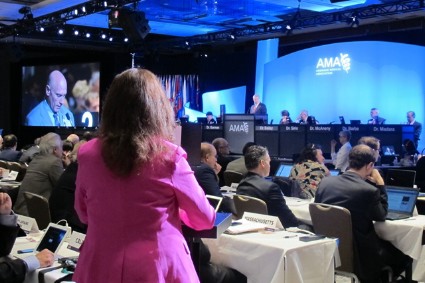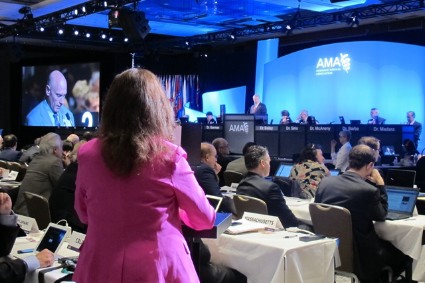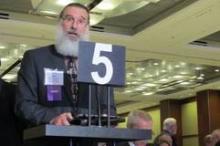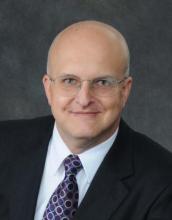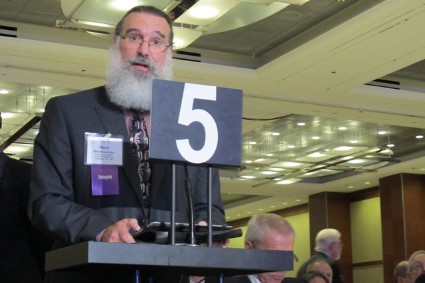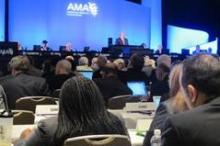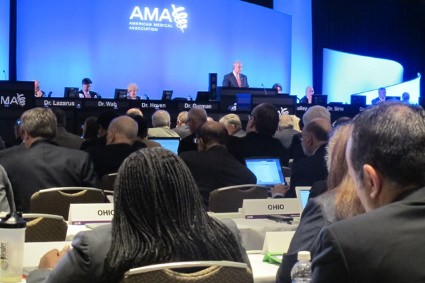User login
American Medical Association (AMA): Annual Meeting of the House of Delegates
Delegates direct AMA to study effect of Maintenance of Certification
CHICAGO – The American Medical Association should continue to work with the American Board of Medical Specialties to address physicians’ concerns about Maintenance of Certification – that was the consensus at the annual meeting of the AMA House of Delegates.
The AMA’s delegates defeated a resolution that asked the organization to put a moratorium on MOC until it was proven to improve the quality of care and patient outcomes. However, they did agree to a new policy that directs the AMA to:
• Explore with independent entities the feasibility of conducting a study to evaluate the effect MOC requirements and Maintenance of Licensure principles have on workforce, practice costs, patient outcomes, patient safety, and patient access.
• Work with the American Board of Medical Specialties and its 24 member boards to collect data on why physicians choose to maintain or discontinue their board certification.
• Work with the ABMS and the Federation of State Medical Boards to study whether MOC and the principles of Maintenance of Licensure are important factors to physicians when deciding whether to retire and whether they have a direct effect on workforce.
• Oppose making MOC mandatory as a condition of medical licensure, and encourage physicians to strive constantly to improve their care of patients by the means they find most effective.
The new policy applies to both the ABMS MOC process and the Osteopathic Continuous Certification (OCC) process.
Physicians have increasingly voiced their concerns about MOC. Dr. Paul Teirstein, chief of cardiology and director of interventional cardiology for Scripps Clinic in La Jolla, Calif., launched a petition drive to overhaul the American Board of Internal Medicine’s MOC process. The petition has more than 17,000 signatures.
The ABIM says that it is listening to physicians and is making changes in the process, but also recently said that more than 150,000 physicians had participated in its MOC process – making the May 1 deadline to be listed on the ABIM website as having met the MOC criteria.
But anger is still bubbling up, and was expressed at the AMA’s meeting.
"Practicing physicians on the front lines are increasingly burdened, hassled, and confused by the onerous and expensive process of Maintenance of Certification and Maintenance of Licensure," said Dr. James A. Goodyear, a delegate from Pennsylvania.
Dr. Goodyear introduced the resolution to seek a moratorium on the MOC.
But Dr. Darlyne Menscer, a member of the AMA Council on Medical Education, told the delegates that such a moratorium would put a wedge in the close working relationship the AMA has had with the ABMS. "This is more prescriptive than we can commit to as a council, although we definitely do hear the concerns of the House," added Dr. Menscer.
The AMA has been discussing the concerns about MOC with the ABMS, most recently holding a meeting in Chicago in early June.
Dr. Joshua Cohen, a delegate from the American Academy of Neurology, and a member of the AMA Foundation’s Board of Directors, who attended that meeting, also argued against a moratorium. "It would make it impossible for the AMA to improve the process going forward," said Dr. Cohen.
Dr. Chuck Wilson, a pediatrician and delegate from the North Carolina delegation, also opposed any major change in direction for the AMA. He noted that if the AMA was seen as opposed to MOC, it might not be viewed well. "We all want it to be less onerous," said Dr. Wilson. But, he noted, "the Council on Medical Education is working in that direction. Let’s give them a chance to be successful."
In a statement after the HOD meeting, the AMA said that it "continues to ensure the MOC process does not disrupt physician practice or reduce the capacity of the overall physician workforce." Concerns about MOC "center around the need for relevance to the daily practice of physicians and the better integration into physician practices to optimally support learning and improvement."
On Twitter @aliciaault
CHICAGO – The American Medical Association should continue to work with the American Board of Medical Specialties to address physicians’ concerns about Maintenance of Certification – that was the consensus at the annual meeting of the AMA House of Delegates.
The AMA’s delegates defeated a resolution that asked the organization to put a moratorium on MOC until it was proven to improve the quality of care and patient outcomes. However, they did agree to a new policy that directs the AMA to:
• Explore with independent entities the feasibility of conducting a study to evaluate the effect MOC requirements and Maintenance of Licensure principles have on workforce, practice costs, patient outcomes, patient safety, and patient access.
• Work with the American Board of Medical Specialties and its 24 member boards to collect data on why physicians choose to maintain or discontinue their board certification.
• Work with the ABMS and the Federation of State Medical Boards to study whether MOC and the principles of Maintenance of Licensure are important factors to physicians when deciding whether to retire and whether they have a direct effect on workforce.
• Oppose making MOC mandatory as a condition of medical licensure, and encourage physicians to strive constantly to improve their care of patients by the means they find most effective.
The new policy applies to both the ABMS MOC process and the Osteopathic Continuous Certification (OCC) process.
Physicians have increasingly voiced their concerns about MOC. Dr. Paul Teirstein, chief of cardiology and director of interventional cardiology for Scripps Clinic in La Jolla, Calif., launched a petition drive to overhaul the American Board of Internal Medicine’s MOC process. The petition has more than 17,000 signatures.
The ABIM says that it is listening to physicians and is making changes in the process, but also recently said that more than 150,000 physicians had participated in its MOC process – making the May 1 deadline to be listed on the ABIM website as having met the MOC criteria.
But anger is still bubbling up, and was expressed at the AMA’s meeting.
"Practicing physicians on the front lines are increasingly burdened, hassled, and confused by the onerous and expensive process of Maintenance of Certification and Maintenance of Licensure," said Dr. James A. Goodyear, a delegate from Pennsylvania.
Dr. Goodyear introduced the resolution to seek a moratorium on the MOC.
But Dr. Darlyne Menscer, a member of the AMA Council on Medical Education, told the delegates that such a moratorium would put a wedge in the close working relationship the AMA has had with the ABMS. "This is more prescriptive than we can commit to as a council, although we definitely do hear the concerns of the House," added Dr. Menscer.
The AMA has been discussing the concerns about MOC with the ABMS, most recently holding a meeting in Chicago in early June.
Dr. Joshua Cohen, a delegate from the American Academy of Neurology, and a member of the AMA Foundation’s Board of Directors, who attended that meeting, also argued against a moratorium. "It would make it impossible for the AMA to improve the process going forward," said Dr. Cohen.
Dr. Chuck Wilson, a pediatrician and delegate from the North Carolina delegation, also opposed any major change in direction for the AMA. He noted that if the AMA was seen as opposed to MOC, it might not be viewed well. "We all want it to be less onerous," said Dr. Wilson. But, he noted, "the Council on Medical Education is working in that direction. Let’s give them a chance to be successful."
In a statement after the HOD meeting, the AMA said that it "continues to ensure the MOC process does not disrupt physician practice or reduce the capacity of the overall physician workforce." Concerns about MOC "center around the need for relevance to the daily practice of physicians and the better integration into physician practices to optimally support learning and improvement."
On Twitter @aliciaault
CHICAGO – The American Medical Association should continue to work with the American Board of Medical Specialties to address physicians’ concerns about Maintenance of Certification – that was the consensus at the annual meeting of the AMA House of Delegates.
The AMA’s delegates defeated a resolution that asked the organization to put a moratorium on MOC until it was proven to improve the quality of care and patient outcomes. However, they did agree to a new policy that directs the AMA to:
• Explore with independent entities the feasibility of conducting a study to evaluate the effect MOC requirements and Maintenance of Licensure principles have on workforce, practice costs, patient outcomes, patient safety, and patient access.
• Work with the American Board of Medical Specialties and its 24 member boards to collect data on why physicians choose to maintain or discontinue their board certification.
• Work with the ABMS and the Federation of State Medical Boards to study whether MOC and the principles of Maintenance of Licensure are important factors to physicians when deciding whether to retire and whether they have a direct effect on workforce.
• Oppose making MOC mandatory as a condition of medical licensure, and encourage physicians to strive constantly to improve their care of patients by the means they find most effective.
The new policy applies to both the ABMS MOC process and the Osteopathic Continuous Certification (OCC) process.
Physicians have increasingly voiced their concerns about MOC. Dr. Paul Teirstein, chief of cardiology and director of interventional cardiology for Scripps Clinic in La Jolla, Calif., launched a petition drive to overhaul the American Board of Internal Medicine’s MOC process. The petition has more than 17,000 signatures.
The ABIM says that it is listening to physicians and is making changes in the process, but also recently said that more than 150,000 physicians had participated in its MOC process – making the May 1 deadline to be listed on the ABIM website as having met the MOC criteria.
But anger is still bubbling up, and was expressed at the AMA’s meeting.
"Practicing physicians on the front lines are increasingly burdened, hassled, and confused by the onerous and expensive process of Maintenance of Certification and Maintenance of Licensure," said Dr. James A. Goodyear, a delegate from Pennsylvania.
Dr. Goodyear introduced the resolution to seek a moratorium on the MOC.
But Dr. Darlyne Menscer, a member of the AMA Council on Medical Education, told the delegates that such a moratorium would put a wedge in the close working relationship the AMA has had with the ABMS. "This is more prescriptive than we can commit to as a council, although we definitely do hear the concerns of the House," added Dr. Menscer.
The AMA has been discussing the concerns about MOC with the ABMS, most recently holding a meeting in Chicago in early June.
Dr. Joshua Cohen, a delegate from the American Academy of Neurology, and a member of the AMA Foundation’s Board of Directors, who attended that meeting, also argued against a moratorium. "It would make it impossible for the AMA to improve the process going forward," said Dr. Cohen.
Dr. Chuck Wilson, a pediatrician and delegate from the North Carolina delegation, also opposed any major change in direction for the AMA. He noted that if the AMA was seen as opposed to MOC, it might not be viewed well. "We all want it to be less onerous," said Dr. Wilson. But, he noted, "the Council on Medical Education is working in that direction. Let’s give them a chance to be successful."
In a statement after the HOD meeting, the AMA said that it "continues to ensure the MOC process does not disrupt physician practice or reduce the capacity of the overall physician workforce." Concerns about MOC "center around the need for relevance to the daily practice of physicians and the better integration into physician practices to optimally support learning and improvement."
On Twitter @aliciaault
AT THE AMA HOD MEETING
Maintenance of certification took center stage at AMA Congress of Delegates
CHICAGO – The American Medical Association should continue to work with the American Board of Medical Specialties to address physicians’ concerns about Maintenance of Certification – that was the consensus at the annual meeting of the AMA House of Delegates.
The AMA’s delegates defeated a resolution that asked the organization to put a moratorium on MOC until it was proven to improve the quality of care and patient outcomes. However, they did agree to a new policy that directs the AMA to:
• Explore with independent entities the feasibility of conducting a study to evaluate the effect MOC requirements and Maintenance of Licensure principles have on workforce, practice costs, patient outcomes, patient safety, and patient access.
• Work with the American Board of Medical Specialties and its 24 member boards to collect data on why physicians choose to maintain or discontinue their board certification.
• Work with the ABMS and the Federation of State Medical Boards to study whether MOC and the principles of Maintenance of Licensure are important factors to physicians when deciding whether to retire and whether they have a direct effect on workforce.
• Oppose making MOC mandatory as a condition of medical licensure, and encourage physicians to strive constantly to improve their care of patients by the means they find most effective.
The new policy applies to both the ABMS MOC process and the Osteopathic Continuous Certification (OCC) process.
Physicians have increasingly voiced their concerns about MOC. Dr. Paul Teirstein, chief of cardiology and director of interventional cardiology for Scripps Clinic in La Jolla, Calif., launched a petition drive to overhaul the American Board of Internal Medicine’s MOC process. The petition has more than 17,000 signatures.
The ABIM says that it is listening to physicians and is making changes in the process, but also recently said that more than 150,000 physicians had participated in its MOC process – making the May 1 deadline to be listed on the ABIM website as having met the MOC criteria.
But anger is still bubbling up, and was expressed at the AMA’s meeting.
"Practicing physicians on the front lines are increasingly burdened, hassled, and confused by the onerous and expensive process of Maintenance of Certification and Maintenance of Licensure," said Dr. James A. Goodyear, a delegate from Pennsylvania.
Dr. Goodyear introduced the resolution to seek a moratorium on the MOC.
But Dr. Darlyne Menscer, a member of the AMA Council on Medical Education, told the delegates that such a moratorium would put a wedge in the close working relationship the AMA has had with the ABMS. "This is more prescriptive than we can commit to as a council, although we definitely do hear the concerns of the House," added Dr. Menscer.
The AMA has been discussing the concerns about MOC with the ABMS, most recently holding a meeting in Chicago in early June.
Dr. Joshua Cohen, a delegate from the American Academy of Neurology, and a member of the AMA Foundation’s Board of Directors, who attended that meeting, also argued against a moratorium. "It would make it impossible for the AMA to improve the process going forward," said Dr. Cohen.
Dr. Chuck Wilson, a pediatrician and delegate from the North Carolina delegation, also opposed any major change in direction for the AMA. He noted that if the AMA was seen as opposed to MOC, it might not be viewed well. "We all want it to be less onerous," said Dr. Wilson. But, he noted, "the Council on Medical Education is working in that direction. Let’s give them a chance to be successful."
In a statement after the HOD meeting, the AMA said that it "continues to ensure the MOC process does not disrupt physician practice or reduce the capacity of the overall physician workforce." Concerns about MOC "center around the need for relevance to the daily practice of physicians and the better integration into physician practices to optimally support learning and improvement."
On Twitter @aliciaault
CHICAGO – The American Medical Association should continue to work with the American Board of Medical Specialties to address physicians’ concerns about Maintenance of Certification – that was the consensus at the annual meeting of the AMA House of Delegates.
The AMA’s delegates defeated a resolution that asked the organization to put a moratorium on MOC until it was proven to improve the quality of care and patient outcomes. However, they did agree to a new policy that directs the AMA to:
• Explore with independent entities the feasibility of conducting a study to evaluate the effect MOC requirements and Maintenance of Licensure principles have on workforce, practice costs, patient outcomes, patient safety, and patient access.
• Work with the American Board of Medical Specialties and its 24 member boards to collect data on why physicians choose to maintain or discontinue their board certification.
• Work with the ABMS and the Federation of State Medical Boards to study whether MOC and the principles of Maintenance of Licensure are important factors to physicians when deciding whether to retire and whether they have a direct effect on workforce.
• Oppose making MOC mandatory as a condition of medical licensure, and encourage physicians to strive constantly to improve their care of patients by the means they find most effective.
The new policy applies to both the ABMS MOC process and the Osteopathic Continuous Certification (OCC) process.
Physicians have increasingly voiced their concerns about MOC. Dr. Paul Teirstein, chief of cardiology and director of interventional cardiology for Scripps Clinic in La Jolla, Calif., launched a petition drive to overhaul the American Board of Internal Medicine’s MOC process. The petition has more than 17,000 signatures.
The ABIM says that it is listening to physicians and is making changes in the process, but also recently said that more than 150,000 physicians had participated in its MOC process – making the May 1 deadline to be listed on the ABIM website as having met the MOC criteria.
But anger is still bubbling up, and was expressed at the AMA’s meeting.
"Practicing physicians on the front lines are increasingly burdened, hassled, and confused by the onerous and expensive process of Maintenance of Certification and Maintenance of Licensure," said Dr. James A. Goodyear, a delegate from Pennsylvania.
Dr. Goodyear introduced the resolution to seek a moratorium on the MOC.
But Dr. Darlyne Menscer, a member of the AMA Council on Medical Education, told the delegates that such a moratorium would put a wedge in the close working relationship the AMA has had with the ABMS. "This is more prescriptive than we can commit to as a council, although we definitely do hear the concerns of the House," added Dr. Menscer.
The AMA has been discussing the concerns about MOC with the ABMS, most recently holding a meeting in Chicago in early June.
Dr. Joshua Cohen, a delegate from the American Academy of Neurology, and a member of the AMA Foundation’s Board of Directors, who attended that meeting, also argued against a moratorium. "It would make it impossible for the AMA to improve the process going forward," said Dr. Cohen.
Dr. Chuck Wilson, a pediatrician and delegate from the North Carolina delegation, also opposed any major change in direction for the AMA. He noted that if the AMA was seen as opposed to MOC, it might not be viewed well. "We all want it to be less onerous," said Dr. Wilson. But, he noted, "the Council on Medical Education is working in that direction. Let’s give them a chance to be successful."
In a statement after the HOD meeting, the AMA said that it "continues to ensure the MOC process does not disrupt physician practice or reduce the capacity of the overall physician workforce." Concerns about MOC "center around the need for relevance to the daily practice of physicians and the better integration into physician practices to optimally support learning and improvement."
On Twitter @aliciaault
CHICAGO – The American Medical Association should continue to work with the American Board of Medical Specialties to address physicians’ concerns about Maintenance of Certification – that was the consensus at the annual meeting of the AMA House of Delegates.
The AMA’s delegates defeated a resolution that asked the organization to put a moratorium on MOC until it was proven to improve the quality of care and patient outcomes. However, they did agree to a new policy that directs the AMA to:
• Explore with independent entities the feasibility of conducting a study to evaluate the effect MOC requirements and Maintenance of Licensure principles have on workforce, practice costs, patient outcomes, patient safety, and patient access.
• Work with the American Board of Medical Specialties and its 24 member boards to collect data on why physicians choose to maintain or discontinue their board certification.
• Work with the ABMS and the Federation of State Medical Boards to study whether MOC and the principles of Maintenance of Licensure are important factors to physicians when deciding whether to retire and whether they have a direct effect on workforce.
• Oppose making MOC mandatory as a condition of medical licensure, and encourage physicians to strive constantly to improve their care of patients by the means they find most effective.
The new policy applies to both the ABMS MOC process and the Osteopathic Continuous Certification (OCC) process.
Physicians have increasingly voiced their concerns about MOC. Dr. Paul Teirstein, chief of cardiology and director of interventional cardiology for Scripps Clinic in La Jolla, Calif., launched a petition drive to overhaul the American Board of Internal Medicine’s MOC process. The petition has more than 17,000 signatures.
The ABIM says that it is listening to physicians and is making changes in the process, but also recently said that more than 150,000 physicians had participated in its MOC process – making the May 1 deadline to be listed on the ABIM website as having met the MOC criteria.
But anger is still bubbling up, and was expressed at the AMA’s meeting.
"Practicing physicians on the front lines are increasingly burdened, hassled, and confused by the onerous and expensive process of Maintenance of Certification and Maintenance of Licensure," said Dr. James A. Goodyear, a delegate from Pennsylvania.
Dr. Goodyear introduced the resolution to seek a moratorium on the MOC.
But Dr. Darlyne Menscer, a member of the AMA Council on Medical Education, told the delegates that such a moratorium would put a wedge in the close working relationship the AMA has had with the ABMS. "This is more prescriptive than we can commit to as a council, although we definitely do hear the concerns of the House," added Dr. Menscer.
The AMA has been discussing the concerns about MOC with the ABMS, most recently holding a meeting in Chicago in early June.
Dr. Joshua Cohen, a delegate from the American Academy of Neurology, and a member of the AMA Foundation’s Board of Directors, who attended that meeting, also argued against a moratorium. "It would make it impossible for the AMA to improve the process going forward," said Dr. Cohen.
Dr. Chuck Wilson, a pediatrician and delegate from the North Carolina delegation, also opposed any major change in direction for the AMA. He noted that if the AMA was seen as opposed to MOC, it might not be viewed well. "We all want it to be less onerous," said Dr. Wilson. But, he noted, "the Council on Medical Education is working in that direction. Let’s give them a chance to be successful."
In a statement after the HOD meeting, the AMA said that it "continues to ensure the MOC process does not disrupt physician practice or reduce the capacity of the overall physician workforce." Concerns about MOC "center around the need for relevance to the daily practice of physicians and the better integration into physician practices to optimally support learning and improvement."
On Twitter @aliciaault
AT THE AMA HOD MEETING
AMA defers action on Medicaid pay parity
CHICAGO – The American Medical Association House of Delegates voted to defer taking action on Medicaid payment policy so that the primary care societies can continue an almost-year-long lobbying effort to convince Congress to extend a Medicaid pay increase.
The pay increase, established under the Affordable Care Act, brings Medicaid pay up to the same level as Medicare reimbursement for eligible primary care physicians. Currently, family physicians, general internists, pediatricians, and subspecialists in those categories are eligible for the pay increase if they are board certified or can show that at least 60% of the codes they submitted to Medicaid in 2012 were for primary care services. The increase expires on Dec. 31.
At least a year ago, the American Academy of Family Physicians, the American College of Physicians, the American Academy of Pediatrics, the American College of Obstetricians and Gynecologists, and the American Osteopathic Association struck an agreement to urge Congress to extend the pay increase for at least 2 years, and to add ob.gyns. to the list of eligible specialists, Dr. Reid Blackwelder, president of the AAFP, said at the House of Delegates meeting.
He offered a resolution to the House to include ob.gyns. as eligible, but the amendment led to some confusion.
The AMA Council on Medical Service was already recommending that the AMA advocate for both an extension of the payments and to add ob.gyns. to the eligibility list, as AMA policy recognizes them as a primary care specialty.
Initially, an amendment had been offered suggesting that ob.gyns. would have to meet different requirements to get the increased pay. That upset some delegates. But Dr. Blackwelder said that his amendment would "use the same accepted threshold methodology" as for internists, pediatricians, and family physicians.
Even so, many delegates said they were not in favor of the resolution. Dr. Lisa Egbert, an ob.gyn. on the Council on Medical Service, said that for one, current legislation did not give her specialty an opportunity to receive the pay increase. The Council report gave clear directions on how the AMA could lobby Congress to change that, she said.
As debate began again the next day, delegates from the AAFP and the ACP retreated from their amendment, and instead asked that it, along with any AMA action on the pay parity issue, be deferred. They noted the ongoing joint effort by the AAFP, ACP, AAP, and ACOG to help persuade Congress that pay parity needed to be extended.
The four societies sent a letter to Senate Finance Committee leaders Ron Wyden (D-Ore.) and Orrin Hatch (R-Utah) and House Energy & Commerce Committee leaders Fred Upton (R-Mich.) and Henry Waxman (D-Calif.) on May 21, seeking the 2-year extension and also to add ob.gyns.
On June 10, it was resent to the same legislators with 16 additional signatories including other osteopathic organizations, the Society of Hospital Medicine, and the Children’s Hospital Association.
Dr. Yul Ejnes, an ACP delegate and a previous ACP board chairman, urged the AMA delegates to defer action. Otherwise, "it would be injurious to [our] effort, as well as to our AMA, if this body came out with different policy that contradicted what the four organizations are trying to do," said Dr. Ejnes.
AAFP Board Chair Jeffrey Cain agreed. "It would be injurious to the AMA’s reputation to come out against the four groups representing primary care on Capitol Hill," he said.
The delegates voted 223-174 to put off action, referring the amendments and the Council’s report for study by the AMA’s Board of Trustees.
On Twitter @aliciaault
CHICAGO – The American Medical Association House of Delegates voted to defer taking action on Medicaid payment policy so that the primary care societies can continue an almost-year-long lobbying effort to convince Congress to extend a Medicaid pay increase.
The pay increase, established under the Affordable Care Act, brings Medicaid pay up to the same level as Medicare reimbursement for eligible primary care physicians. Currently, family physicians, general internists, pediatricians, and subspecialists in those categories are eligible for the pay increase if they are board certified or can show that at least 60% of the codes they submitted to Medicaid in 2012 were for primary care services. The increase expires on Dec. 31.
At least a year ago, the American Academy of Family Physicians, the American College of Physicians, the American Academy of Pediatrics, the American College of Obstetricians and Gynecologists, and the American Osteopathic Association struck an agreement to urge Congress to extend the pay increase for at least 2 years, and to add ob.gyns. to the list of eligible specialists, Dr. Reid Blackwelder, president of the AAFP, said at the House of Delegates meeting.
He offered a resolution to the House to include ob.gyns. as eligible, but the amendment led to some confusion.
The AMA Council on Medical Service was already recommending that the AMA advocate for both an extension of the payments and to add ob.gyns. to the eligibility list, as AMA policy recognizes them as a primary care specialty.
Initially, an amendment had been offered suggesting that ob.gyns. would have to meet different requirements to get the increased pay. That upset some delegates. But Dr. Blackwelder said that his amendment would "use the same accepted threshold methodology" as for internists, pediatricians, and family physicians.
Even so, many delegates said they were not in favor of the resolution. Dr. Lisa Egbert, an ob.gyn. on the Council on Medical Service, said that for one, current legislation did not give her specialty an opportunity to receive the pay increase. The Council report gave clear directions on how the AMA could lobby Congress to change that, she said.
As debate began again the next day, delegates from the AAFP and the ACP retreated from their amendment, and instead asked that it, along with any AMA action on the pay parity issue, be deferred. They noted the ongoing joint effort by the AAFP, ACP, AAP, and ACOG to help persuade Congress that pay parity needed to be extended.
The four societies sent a letter to Senate Finance Committee leaders Ron Wyden (D-Ore.) and Orrin Hatch (R-Utah) and House Energy & Commerce Committee leaders Fred Upton (R-Mich.) and Henry Waxman (D-Calif.) on May 21, seeking the 2-year extension and also to add ob.gyns.
On June 10, it was resent to the same legislators with 16 additional signatories including other osteopathic organizations, the Society of Hospital Medicine, and the Children’s Hospital Association.
Dr. Yul Ejnes, an ACP delegate and a previous ACP board chairman, urged the AMA delegates to defer action. Otherwise, "it would be injurious to [our] effort, as well as to our AMA, if this body came out with different policy that contradicted what the four organizations are trying to do," said Dr. Ejnes.
AAFP Board Chair Jeffrey Cain agreed. "It would be injurious to the AMA’s reputation to come out against the four groups representing primary care on Capitol Hill," he said.
The delegates voted 223-174 to put off action, referring the amendments and the Council’s report for study by the AMA’s Board of Trustees.
On Twitter @aliciaault
CHICAGO – The American Medical Association House of Delegates voted to defer taking action on Medicaid payment policy so that the primary care societies can continue an almost-year-long lobbying effort to convince Congress to extend a Medicaid pay increase.
The pay increase, established under the Affordable Care Act, brings Medicaid pay up to the same level as Medicare reimbursement for eligible primary care physicians. Currently, family physicians, general internists, pediatricians, and subspecialists in those categories are eligible for the pay increase if they are board certified or can show that at least 60% of the codes they submitted to Medicaid in 2012 were for primary care services. The increase expires on Dec. 31.
At least a year ago, the American Academy of Family Physicians, the American College of Physicians, the American Academy of Pediatrics, the American College of Obstetricians and Gynecologists, and the American Osteopathic Association struck an agreement to urge Congress to extend the pay increase for at least 2 years, and to add ob.gyns. to the list of eligible specialists, Dr. Reid Blackwelder, president of the AAFP, said at the House of Delegates meeting.
He offered a resolution to the House to include ob.gyns. as eligible, but the amendment led to some confusion.
The AMA Council on Medical Service was already recommending that the AMA advocate for both an extension of the payments and to add ob.gyns. to the eligibility list, as AMA policy recognizes them as a primary care specialty.
Initially, an amendment had been offered suggesting that ob.gyns. would have to meet different requirements to get the increased pay. That upset some delegates. But Dr. Blackwelder said that his amendment would "use the same accepted threshold methodology" as for internists, pediatricians, and family physicians.
Even so, many delegates said they were not in favor of the resolution. Dr. Lisa Egbert, an ob.gyn. on the Council on Medical Service, said that for one, current legislation did not give her specialty an opportunity to receive the pay increase. The Council report gave clear directions on how the AMA could lobby Congress to change that, she said.
As debate began again the next day, delegates from the AAFP and the ACP retreated from their amendment, and instead asked that it, along with any AMA action on the pay parity issue, be deferred. They noted the ongoing joint effort by the AAFP, ACP, AAP, and ACOG to help persuade Congress that pay parity needed to be extended.
The four societies sent a letter to Senate Finance Committee leaders Ron Wyden (D-Ore.) and Orrin Hatch (R-Utah) and House Energy & Commerce Committee leaders Fred Upton (R-Mich.) and Henry Waxman (D-Calif.) on May 21, seeking the 2-year extension and also to add ob.gyns.
On June 10, it was resent to the same legislators with 16 additional signatories including other osteopathic organizations, the Society of Hospital Medicine, and the Children’s Hospital Association.
Dr. Yul Ejnes, an ACP delegate and a previous ACP board chairman, urged the AMA delegates to defer action. Otherwise, "it would be injurious to [our] effort, as well as to our AMA, if this body came out with different policy that contradicted what the four organizations are trying to do," said Dr. Ejnes.
AAFP Board Chair Jeffrey Cain agreed. "It would be injurious to the AMA’s reputation to come out against the four groups representing primary care on Capitol Hill," he said.
The delegates voted 223-174 to put off action, referring the amendments and the Council’s report for study by the AMA’s Board of Trustees.
On Twitter @aliciaault
AT THE AMA HOD MEETING
AMA calls for background checks for all gun purchases
CHICAGO – The American Medical Association said it will back legislation to require criminal background checks for all gun sales, whether they are public or private.
The House of Delegates voted at its annual meeting to approve the new policy position as a public health issue. The debate and vote took place June 10, the same day as an Oregon school shooting where a high school student and the shooter died.
The resolution to support background checks was brought forward by the Illinois delegation to the House.
Dr. Maryanne C. Bombaugh, an alternate delegate with the Massachusetts Medical Society, introduced an amendment to extend background checks to all gun transfers, as well.
Dr. Bombaugh, an ob.gyn. in Falmouth, Mass., said that adding transfers would help close many loopholes that private sellers use to skirt background checks.
But some delegates said that might be impossible to enforce, and might interfere with transfers among family members. Louisiana delegate Dr. Vincent Culotta said that he had been given a gun by his father to use for hunting when he was younger, and that he did not think that type of transfer should be subject to a background check.
Another delegate, a psychiatrist, said that background checks on transfers could potentially stop family members from taking possession of guns that relatives might use in suicide attempts.
But others said they supported more scrutiny of transfers. One delegate said it might prevent one person from buying a gun for someone else who could not pass a background check.
Another suggested that requiring checks on transfers – even for family members – made sense, just as transferring ownership of a vehicle required a check that the recipient possessed a driver’s license.
On Twitter @aliciaault
CHICAGO – The American Medical Association said it will back legislation to require criminal background checks for all gun sales, whether they are public or private.
The House of Delegates voted at its annual meeting to approve the new policy position as a public health issue. The debate and vote took place June 10, the same day as an Oregon school shooting where a high school student and the shooter died.
The resolution to support background checks was brought forward by the Illinois delegation to the House.
Dr. Maryanne C. Bombaugh, an alternate delegate with the Massachusetts Medical Society, introduced an amendment to extend background checks to all gun transfers, as well.
Dr. Bombaugh, an ob.gyn. in Falmouth, Mass., said that adding transfers would help close many loopholes that private sellers use to skirt background checks.
But some delegates said that might be impossible to enforce, and might interfere with transfers among family members. Louisiana delegate Dr. Vincent Culotta said that he had been given a gun by his father to use for hunting when he was younger, and that he did not think that type of transfer should be subject to a background check.
Another delegate, a psychiatrist, said that background checks on transfers could potentially stop family members from taking possession of guns that relatives might use in suicide attempts.
But others said they supported more scrutiny of transfers. One delegate said it might prevent one person from buying a gun for someone else who could not pass a background check.
Another suggested that requiring checks on transfers – even for family members – made sense, just as transferring ownership of a vehicle required a check that the recipient possessed a driver’s license.
On Twitter @aliciaault
CHICAGO – The American Medical Association said it will back legislation to require criminal background checks for all gun sales, whether they are public or private.
The House of Delegates voted at its annual meeting to approve the new policy position as a public health issue. The debate and vote took place June 10, the same day as an Oregon school shooting where a high school student and the shooter died.
The resolution to support background checks was brought forward by the Illinois delegation to the House.
Dr. Maryanne C. Bombaugh, an alternate delegate with the Massachusetts Medical Society, introduced an amendment to extend background checks to all gun transfers, as well.
Dr. Bombaugh, an ob.gyn. in Falmouth, Mass., said that adding transfers would help close many loopholes that private sellers use to skirt background checks.
But some delegates said that might be impossible to enforce, and might interfere with transfers among family members. Louisiana delegate Dr. Vincent Culotta said that he had been given a gun by his father to use for hunting when he was younger, and that he did not think that type of transfer should be subject to a background check.
Another delegate, a psychiatrist, said that background checks on transfers could potentially stop family members from taking possession of guns that relatives might use in suicide attempts.
But others said they supported more scrutiny of transfers. One delegate said it might prevent one person from buying a gun for someone else who could not pass a background check.
Another suggested that requiring checks on transfers – even for family members – made sense, just as transferring ownership of a vehicle required a check that the recipient possessed a driver’s license.
On Twitter @aliciaault
AT THE AMA HOD MEETING

